SWEDISH
SOUTH ASIAN STUDIES NETWORK
Newsletter 85:
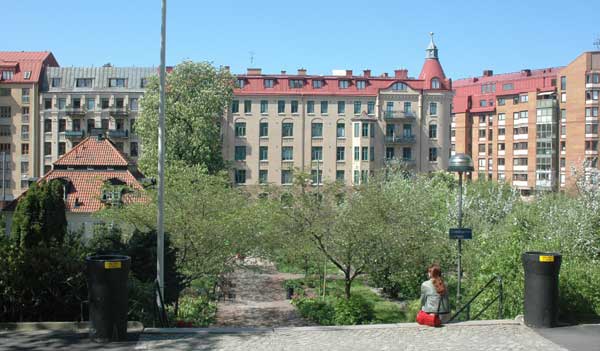 20 May 2008
20 May 2008
| Educational News |
| Politics and Business |
| South Asia related Culture |
| New and updated information |
• SASNET visit to Göteborg University
On Tuesday 13 May 2008, Lars Eklund and Sidsel Hansson from SASNET again visited Göteborg University. In the morning they visited different medical departments at Sahlgrenska Academy involved in research collaboration with Pakistan, Bangladesh and Nepal. In the afternoon a meeting was organised at the School of Global Studies for several researchers working on South Asia related projects at different divisions within the School of Global Studies, as well as a few researchers coming from other departments in the Faculty of Humanities at Göteborg University. Full information about the SASNET visit to Göteborg on May 13, 2008.
• Well-attended SASNET/UPF lecture with Professor Venkatesh B. Athreya
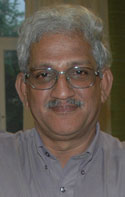 Professor Venkatesh B. Athreya, MS Swaminathan Foundation, Chennai, India, held a well-attended SASNET/UPF lecture at Lund University on Monday 12 May 2008, 19.00–21.00. The lecture, jointly organised by SASNET and the Association of Foreign Affairs at Lund University (UPF), was titled ”Wealth and Poverty in
Rapidly Globalising India”. Currently, Prof. Athreya is co-operating with the Swedish sociologists Göran Djurfeldt and Staffan Lindberg, Dept. of Sociology, Lund University; and the two Indian researchers Dr. R. Vidyasagar from the Madras Institute of Development Studies in Chennai, India, and Dr. A. Rajagopal from SaciWATERs in Hyderabad, in a restudy of 300 agricultural households in Tiruchirapalli District, Tamil Nadu, people who were originally interviewed in 1979/80. The reason for coming to Lund was actually to participate in a concluding workshop regarding this project. More information, with fact sheets from the lecture.
Professor Venkatesh B. Athreya, MS Swaminathan Foundation, Chennai, India, held a well-attended SASNET/UPF lecture at Lund University on Monday 12 May 2008, 19.00–21.00. The lecture, jointly organised by SASNET and the Association of Foreign Affairs at Lund University (UPF), was titled ”Wealth and Poverty in
Rapidly Globalising India”. Currently, Prof. Athreya is co-operating with the Swedish sociologists Göran Djurfeldt and Staffan Lindberg, Dept. of Sociology, Lund University; and the two Indian researchers Dr. R. Vidyasagar from the Madras Institute of Development Studies in Chennai, India, and Dr. A. Rajagopal from SaciWATERs in Hyderabad, in a restudy of 300 agricultural households in Tiruchirapalli District, Tamil Nadu, people who were originally interviewed in 1979/80. The reason for coming to Lund was actually to participate in a concluding workshop regarding this project. More information, with fact sheets from the lecture.
• SASNET Report from Globe Forum 2008
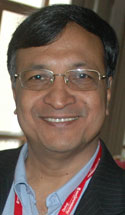 SASNET’s acting director, Dr. Sidsel Hansson, and its deputy director, Lars Eklund, participated in the Globe Forum Conference 2008, held in Stockholm 7–8 May 2008.
The
Swedish International Development Cooperation Agency (Sida) was one of Globe Forum's partners this year. Sida's new Director-General Anders Nordström was one of the keynote speakers. Other invited speakers for the 2008 Globe Forum included Dipal Chandra Barua (photo to the right),
Deputy Managing Director for
Grameen Shakti (the
Nobel Prize Laureate microcredit institution); K.P. Nyati,
Principal Adviser, Confederation of Indian Industry (CII); and Bharti Patel from the
Society for Voluntary Action Revitalisation and Justice (SVARAJ) in Bangalore. Mr. Barua and Ms. Patel participated in a seminar on ”The rise of microfinance: How village women challenge Wall Street men”. Read a SASNET report from Globe Forum 2008.
SASNET’s acting director, Dr. Sidsel Hansson, and its deputy director, Lars Eklund, participated in the Globe Forum Conference 2008, held in Stockholm 7–8 May 2008.
The
Swedish International Development Cooperation Agency (Sida) was one of Globe Forum's partners this year. Sida's new Director-General Anders Nordström was one of the keynote speakers. Other invited speakers for the 2008 Globe Forum included Dipal Chandra Barua (photo to the right),
Deputy Managing Director for
Grameen Shakti (the
Nobel Prize Laureate microcredit institution); K.P. Nyati,
Principal Adviser, Confederation of Indian Industry (CII); and Bharti Patel from the
Society for Voluntary Action Revitalisation and Justice (SVARAJ) in Bangalore. Mr. Barua and Ms. Patel participated in a seminar on ”The rise of microfinance: How village women challenge Wall Street men”. Read a SASNET report from Globe Forum 2008.
• SASNET participation in FOI workshop on Pakistan
On Tuesday 1 April 2008, SASNET’s deputy director Lars Eklund participated in a workshop on Pakistan, organised by the Swedish Defence Research Agency (FOI) in Stockholm. The workshop was held as part of an ongoing FOI research programme on Asian Security, and other participants were invited from different Swedish universities, research institutes and government departments. The Swedish Defence Research Agency has recently initiated a number of sub-projects dealing with Pakistan. One project focuses on militant movements in Afghanistan & Pakistan, a second on
Pakistan’s nuclear weapons: Safety, security and non-state threats; and a third on the Federally Administered Tribal Areas (FATA). In a special project, the FOI researchers will study Pakistan’s development after the parliamentary elections held in February 2008.
• Time to apply for SASNET grants
 Applications are now invited for the 2008 round of SASNET grants. Closing date for applications is
15 June 2008. There are three kinds of grants offered by SASNET:
Applications are now invited for the 2008 round of SASNET grants. Closing date for applications is
15 June 2008. There are three kinds of grants offered by SASNET:
– 1. Networking grants for planning new research and/or
education programmes or projects in collaboration between Swedish and South Asian partners;
– 2. Guest lecture programme grants (for inviting a guest lecturer
from South Asia to visit Swedish
universities), and
– 3. Grants for organising South Asia related interdisciplinary research
workshops either in Sweden or in South Asia.
Please note that the main applicant must always be
a researcher or teacher based at a Swedish university. All previously distributed SASNET grants are presented on our web page (go for the complete list).
Decisions will be taken in late August 2008. More information.
• Two months to go before Uppsala research conference on Nature, Knowledge, Power
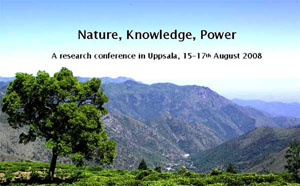 A research conference titled ”Nature, Knowledge, Power” will be held in Uppsala 15–17 August 2008. The conference, aiming at bringing together researchers from different academic fields, concerned with questions of environment and society under present and historical conditions, is
co-organised by SASNET, the Dept. for Rural and Urban Development at the Swedish University for Agricultural Sciences (SLU), and Uppsala Centre for Sustainable Development (CSD). The themes for the sessions are: – Energy: renewable and sustainable?; Competing rights, codifying law; – Community rights under neoliberal rule; – Who needs conservation? Nature, people, survival ; – Contested urban environments; and – Ideologies of environmental change: from imperial modernization to postcolonial social equality? Deadline for applications to the conference was 31 March 2008. More information.
A research conference titled ”Nature, Knowledge, Power” will be held in Uppsala 15–17 August 2008. The conference, aiming at bringing together researchers from different academic fields, concerned with questions of environment and society under present and historical conditions, is
co-organised by SASNET, the Dept. for Rural and Urban Development at the Swedish University for Agricultural Sciences (SLU), and Uppsala Centre for Sustainable Development (CSD). The themes for the sessions are: – Energy: renewable and sustainable?; Competing rights, codifying law; – Community rights under neoliberal rule; – Who needs conservation? Nature, people, survival ; – Contested urban environments; and – Ideologies of environmental change: from imperial modernization to postcolonial social equality? Deadline for applications to the conference was 31 March 2008. More information.
• More information about SASNET and its
activities
See SASNET’s page, http://www.sasnet.lu.se/sasnet.html
• South Asian Regional Cooperation
Academic Network formed
 A new network trying to connect the academic community in South Asia (Afghanistan, Bangladesh, Bhutan, India,
Maldives, Nepal, Pakistan, and Sri Lanka) has recently been formed as a Canadian initiative. It is known as the South Asian Regional Cooperation
Academic Network (SARCAN), and will be coordinated by Dr. T.V. Paul (photo to the right), James McGill Professor of International Relations at the Université de Montréal–McGill Joint Research Group in International Security Studies (REGIS) in Montreal. Mr. Manish Thapa from the Asian Study Center for Political & Conflict Transformation (ASPECT) in
Kathmandu, Nepal, will be the Regional Coordinator of the network, working from
Nepal. The networking project is sponsored by the projects on ”Globalization and the National
Security State”, and ”When Regions Transform: From Conflict to
Cooperation”, both funded by the Fonds Quebecois de la recherche sur la societe et la culture (FQRSC) in Canada. The SARCAN network hopes to bring
together the diverse groups of academics; organisations and practitioners
working on multi-faceted issue areas of South Asian regional cooperation
around the world by putting together a large online and searchable
database of academic work, publications, organisations and their work
profiles into one central site, where they can come together, increase
their online presence and share information. The SARCAN website (www.sarcan.org) will be fully operational from October 2008. More information about the SARCAN network (as a pdf-file)
A new network trying to connect the academic community in South Asia (Afghanistan, Bangladesh, Bhutan, India,
Maldives, Nepal, Pakistan, and Sri Lanka) has recently been formed as a Canadian initiative. It is known as the South Asian Regional Cooperation
Academic Network (SARCAN), and will be coordinated by Dr. T.V. Paul (photo to the right), James McGill Professor of International Relations at the Université de Montréal–McGill Joint Research Group in International Security Studies (REGIS) in Montreal. Mr. Manish Thapa from the Asian Study Center for Political & Conflict Transformation (ASPECT) in
Kathmandu, Nepal, will be the Regional Coordinator of the network, working from
Nepal. The networking project is sponsored by the projects on ”Globalization and the National
Security State”, and ”When Regions Transform: From Conflict to
Cooperation”, both funded by the Fonds Quebecois de la recherche sur la societe et la culture (FQRSC) in Canada. The SARCAN network hopes to bring
together the diverse groups of academics; organisations and practitioners
working on multi-faceted issue areas of South Asian regional cooperation
around the world by putting together a large online and searchable
database of academic work, publications, organisations and their work
profiles into one central site, where they can come together, increase
their online presence and share information. The SARCAN website (www.sarcan.org) will be fully operational from October 2008. More information about the SARCAN network (as a pdf-file)
• Linnaues Palme exchange programme grants to 31 South Asia related projects
 On 12 May 2008, decisions
were taken about Linnaeus Palme exchange programme grants
for 2008-09.
The eighth round of applications for Linnaeus Palme grants,
for the contract period 1 July 2008–
30 June 2009, were decided upon by the Swedish International Programme
Office for Education and Training. Out of 244
projects given grants, 3 are with Bangladesh, 20 with India, 2
with Nepal, 3 with Pakistan, and 3 with Sri Lanka. The Linnaeus Palme exchange
programme was introduced in May 2000, for teachers and students at undergraduate
and master's level of higher education and aims at strengthening co-operation
between institutions of higher education in Sweden and developing countries
and thereby increasing global contacts in the world of higher education. Go
for the full list of Linnaeus Palme grants 2008 (as a pdf-file). See
separate SASNET list on South Asia related projects.
On 12 May 2008, decisions
were taken about Linnaeus Palme exchange programme grants
for 2008-09.
The eighth round of applications for Linnaeus Palme grants,
for the contract period 1 July 2008–
30 June 2009, were decided upon by the Swedish International Programme
Office for Education and Training. Out of 244
projects given grants, 3 are with Bangladesh, 20 with India, 2
with Nepal, 3 with Pakistan, and 3 with Sri Lanka. The Linnaeus Palme exchange
programme was introduced in May 2000, for teachers and students at undergraduate
and master's level of higher education and aims at strengthening co-operation
between institutions of higher education in Sweden and developing countries
and thereby increasing global contacts in the world of higher education. Go
for the full list of Linnaeus Palme grants 2008 (as a pdf-file). See
separate SASNET list on South Asia related projects.
• India-Sweden collaboration projects in S&T presented at VINNOVA meeting
![]() On Monday 19 May 2008, an Information and Networking meeting on India-Sweden collaboration in the field of Science & Technology (S&T) was held in Stockholm. The meeting was organised by the Swedish Governmental Agency for Innovation Systems, VINNOVA, in collaboration with the Embassy of India in Stockholm. Several ongoing India-Sweden collaboration projects in S&T were presented. Dr. Stefan Jonsson, Science and Technology Counsellor, Embassy of Sweden in New Delhi talked about ITPS – The Swedish Institute for Growth Policy Studies, responsible for the so-called Facility
for Environmental Initiatives and Innovations (more information about the Facility). Prof. Ramon Wyss, Royal Institute of Technology (KTH), Stockholm presented INSTEC – the national network for India-Swedish Cooperation on Technical Research and Education (more information about INSTEC, below). Prof. Jan Engvall from Linköping University talked about e-Health and Visualization; and researchers from Uppsala University and Karolinska Institutet Medical University in Stockholm talked about TB research and new TB Vaccines. SASNET’s acting director, Dr. Sidsel Hansson also participated in the meeting.
On Monday 19 May 2008, an Information and Networking meeting on India-Sweden collaboration in the field of Science & Technology (S&T) was held in Stockholm. The meeting was organised by the Swedish Governmental Agency for Innovation Systems, VINNOVA, in collaboration with the Embassy of India in Stockholm. Several ongoing India-Sweden collaboration projects in S&T were presented. Dr. Stefan Jonsson, Science and Technology Counsellor, Embassy of Sweden in New Delhi talked about ITPS – The Swedish Institute for Growth Policy Studies, responsible for the so-called Facility
for Environmental Initiatives and Innovations (more information about the Facility). Prof. Ramon Wyss, Royal Institute of Technology (KTH), Stockholm presented INSTEC – the national network for India-Swedish Cooperation on Technical Research and Education (more information about INSTEC, below). Prof. Jan Engvall from Linköping University talked about e-Health and Visualization; and researchers from Uppsala University and Karolinska Institutet Medical University in Stockholm talked about TB research and new TB Vaccines. SASNET’s acting director, Dr. Sidsel Hansson also participated in the meeting.
• Doctoral dissertation about social capital and development in war-torn Sri Lanka
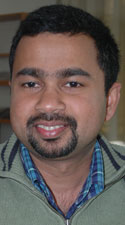 Dhammika Herath, Division of Peace and Development Research (PADRIGU), School
of Global Studies, Göteborg University, will defend his doctoral dissertation titled ”Rural Development through Social Capital? An inquest into the linkages between social capital and development in war-torn villages in Sri Lanka” on Friday 30 May 2008, 10.15–12.00. It concerns the potential causal relationship between social capital and rural development in war-torn villages in the north of Sri Lanka. The social capital thesis centers on the notion that social relationships matter to development-related outcomes and reconstruction of war-torn societies.
Faculty opponent will be Dr Jonathan Goodhand, Dept. of Development Studies, School of Oriental and African Studies (SOAS), University of London, UK. Venue: Room School of Global Studies, SA514, Annedalseminariet, Övre Husargatan 34, Göteborg. Read the abstract of the thesis.
Dhammika Herath, Division of Peace and Development Research (PADRIGU), School
of Global Studies, Göteborg University, will defend his doctoral dissertation titled ”Rural Development through Social Capital? An inquest into the linkages between social capital and development in war-torn villages in Sri Lanka” on Friday 30 May 2008, 10.15–12.00. It concerns the potential causal relationship between social capital and rural development in war-torn villages in the north of Sri Lanka. The social capital thesis centers on the notion that social relationships matter to development-related outcomes and reconstruction of war-torn societies.
Faculty opponent will be Dr Jonathan Goodhand, Dept. of Development Studies, School of Oriental and African Studies (SOAS), University of London, UK. Venue: Room School of Global Studies, SA514, Annedalseminariet, Övre Husargatan 34, Göteborg. Read the abstract of the thesis.
• Doctoral dissertation about water situation in Bangalore
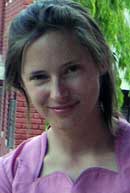 Jenny Grönwall, Department of Water and Environmental Studies,
Tema Institute, Linköping
University, will defend her doctoral dissertation titled ”Access to water
Rights, obligations and the Bangalore situation” on Wednesday 4 June 2008, 13.00. The thesis deals with the city of Bangalore, undergoing rapid urbanisation and administrative transition. Its growth puts pressure on the available water sources – being mainly the disputed inter-State River Cauvery and the hard-rock aquifers – with ensuing problems of access. The dissertation shows that we cannot talk in terms of water and rights until we are aware of how complex rights apply simultaneously, and how they correspond to obligations. Faculty opponent will be Professor S. Janakarajan from Madras Institute of Development Studies (MIDS)in Chennai, India. Venue: Elysion, House T, Campus Valla, Linköping University. More information.
Jenny Grönwall, Department of Water and Environmental Studies,
Tema Institute, Linköping
University, will defend her doctoral dissertation titled ”Access to water
Rights, obligations and the Bangalore situation” on Wednesday 4 June 2008, 13.00. The thesis deals with the city of Bangalore, undergoing rapid urbanisation and administrative transition. Its growth puts pressure on the available water sources – being mainly the disputed inter-State River Cauvery and the hard-rock aquifers – with ensuing problems of access. The dissertation shows that we cannot talk in terms of water and rights until we are aware of how complex rights apply simultaneously, and how they correspond to obligations. Faculty opponent will be Professor S. Janakarajan from Madras Institute of Development Studies (MIDS)in Chennai, India. Venue: Elysion, House T, Campus Valla, Linköping University. More information.
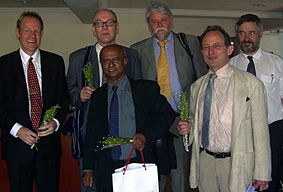 |
| INSTEC delegation to India in April 2008. From left to right: Professors Lars Öberg, Umeå University, Lars-Christer Lundin, Uppsala University, Göran Baurne, Royal Institute of Technology, Stockholm, and Björn Karlsson, LTH, Lund University at the back, with Prof. Baboo M. Nair of LTH, Lund University, and Prof Ramon Wyss of Royal Institute of Technology, Stockholm in the front. |
• Report from INSTEC delegation tour to India
The efforts to create INSTEC, a national network centre for Indo-Swedish Cooperation on Technical Research and Education, are proceeding well. The networking initiative, originally an idea born out of a contact journey by a Royal Institue of Technology (KTH) delegation to India in 2002, now consists of eight Swedish universities (Blekinge Institute of Technology; Chalmers University of Technology; Linköping University; Luleå University of Technology; Lund University, Swedish University of Agricultural Sciences; and Uppsala University, besides KTH), and one research institute – IVL (Swedish Environmental Research Institute). INSTEC is funded by the Swedish Governmental Agency for Innovation Systems, VINNOVA. More information about INSTEC.
In order to strenghten the work, INSTEC plans to set up a platform at the Indian Institute of Technology (IIT) Delhi, to establish an Indian network and a centre for environmental technology, and also organise a workshop to be held in collaboration with INSTEC’s Indian partners in 2008. As a preparation for this, a delegation from the INSTEC member institutions visited India in March-April 2008. Read a report from the tour, written by Prof. Baboo Nair, Lund University.
• Nobel laureates appeal for jailed human rights activist in Chhattisgarh
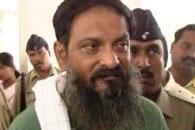 Twenty-two Nobel laureates from around the world have appealed to the Indian government to release jailed human rights activist Dr. Binayak Sen of Raipur, Chhattisgarh, India.
The appeal has been made in a letter to India's president and prime minister.
They say Dr Sen should be allowed to travel to the US to receive the Jonathan Mann Award for Global Health and Human Rights announced in April by the US-based Global Health Council.
Dr. Sen has helped establish a hospital serving poor mine workers in Chhattisgarh, founded a health and human rights organization that supports community health workers in 20 villages, and is an officer of the People’s Union for Civil Liberties (PUCL), has been held in prison accused of links to Maoist rebels for nearly a year. He denies the charge. Protest demonstrations are held around the world (also in Stockholm) on May 13th and 14th – the anniversary of Sen's arrest in 2007. More information.
Twenty-two Nobel laureates from around the world have appealed to the Indian government to release jailed human rights activist Dr. Binayak Sen of Raipur, Chhattisgarh, India.
The appeal has been made in a letter to India's president and prime minister.
They say Dr Sen should be allowed to travel to the US to receive the Jonathan Mann Award for Global Health and Human Rights announced in April by the US-based Global Health Council.
Dr. Sen has helped establish a hospital serving poor mine workers in Chhattisgarh, founded a health and human rights organization that supports community health workers in 20 villages, and is an officer of the People’s Union for Civil Liberties (PUCL), has been held in prison accused of links to Maoist rebels for nearly a year. He denies the charge. Protest demonstrations are held around the world (also in Stockholm) on May 13th and 14th – the anniversary of Sen's arrest in 2007. More information.
• New Professor in Indian Studies at Copenhagen Business School
 Anthony P. D’Costa has been appointed new Professor in Indian Studies at the Asia Research Centre and the Department of International Economics and Management, Copenhagen Business School (CBS). Before coming to Copenhagen, he has been Professor of Comparative International Development for many years at the
University of Washington in Tacoma, USA. His current research focuses on the political economy of the international mobility of IT professionals and India’s globalization. Prof. D’Costa held his inaugural lecture at CBS on Wednesday 14 May 2008. The theme for his lecture was ”A New Face of India in the Long Twentieth Century and its Future Implications”.
Anthony P. D’Costa has been appointed new Professor in Indian Studies at the Asia Research Centre and the Department of International Economics and Management, Copenhagen Business School (CBS). Before coming to Copenhagen, he has been Professor of Comparative International Development for many years at the
University of Washington in Tacoma, USA. His current research focuses on the political economy of the international mobility of IT professionals and India’s globalization. Prof. D’Costa held his inaugural lecture at CBS on Wednesday 14 May 2008. The theme for his lecture was ”A New Face of India in the Long Twentieth Century and its Future Implications”.
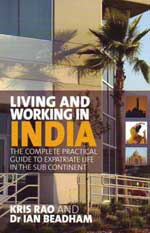 • Practical Guide to Expatriate Life in the Indian subcontinent
• Practical Guide to Expatriate Life in the Indian subcontinent
Dr. Kris Rao and Dr. Ian Beadham has written a book titled ”Living and Working in India: The Complete, Practical Guide to Expatriate Life in the Sub Continent”. The book, based on personal experiences, tries to ease the
transition between Western and Indian cultures, giving a wealth of advice in
terms of language, culture, lifestyle, education, health, housing,
immigration, working practices and regulations. Excerpts from the book are available online on Dr. Rao’s blog page (go for it!). The authors have decided to donate the proceeds to Cancervive, a charity providing support to children with cancer in Mangalore on the Indian west coast (Dr. Rao is an alumni of Mangalore University). More information.
• NIAS-LINC runs blog service for Nordic researchers at AsiaPortal
 The AsiaPortal, established by the Nordic Institute for Asian Studies Library & Information Centre (NIAS-LINC) in Copenhagen, runs a blog service called ”In Focus”.
In this section of the AsiaPortal, up-to-date topics are addressed, and Nordic scholars working within the field of Asian studies are invited to write a short opinion in an attached blog. Currently (April 25, 2008), it contains a blog written by NIAS researcher Stig Toft Madsen, titled ”On Freedom of Speech and Compulsions of Silence”. Go for the text.
More Nordic researchers, students, experts and others interested in the topic are now invited to give their comments in the blog. The ambition is to establish a network of people who would be interested to participate with opinions in future In Focus themes. Anyone interested should contact Inga-Lill Blomkvist, Anja Møller Rasmussen or Per Hansen at NIAS LINC.
The AsiaPortal, established by the Nordic Institute for Asian Studies Library & Information Centre (NIAS-LINC) in Copenhagen, runs a blog service called ”In Focus”.
In this section of the AsiaPortal, up-to-date topics are addressed, and Nordic scholars working within the field of Asian studies are invited to write a short opinion in an attached blog. Currently (April 25, 2008), it contains a blog written by NIAS researcher Stig Toft Madsen, titled ”On Freedom of Speech and Compulsions of Silence”. Go for the text.
More Nordic researchers, students, experts and others interested in the topic are now invited to give their comments in the blog. The ambition is to establish a network of people who would be interested to participate with opinions in future In Focus themes. Anyone interested should contact Inga-Lill Blomkvist, Anja Møller Rasmussen or Per Hansen at NIAS LINC.
• UNESCO promotes Open Access and Digital Library initiatives in South Asia
 The South Asia sub-region is in the forefront of the Open Access movement within developing countries in the world, with India being the most prominent partner in terms of its successful Open Access and Digital Library initiatives. Institutional and policy frameworks in India also facilitate innovative solutions for increasing international visibility and accessibility of scholarly literature and documentary heritage in this country. A number of UNESCO-supported international conferences and workshops have been held in India – the 4th International Conference of Asian Digital Libraries in Bangalore 2001, the International Conferences on Digital Libraries in New Delhi 2004, and the International Workshop on Greenstone Digital Library Software in Kozhikode 2006. As a result, a book titled ”Open access to knowledge and information: scholarly literature and digital library initiatives; the South Asian scenario” (UNESCO publications 2008) has now appeared, where many information professionals of the sub-region demonstrates their successful Digital Library and Open Access initiatives. It has been authored by Anup Kumar Das, and edited by Bimal Kanti Sen, Jocelyne Josaih. More information about the book.
The South Asia sub-region is in the forefront of the Open Access movement within developing countries in the world, with India being the most prominent partner in terms of its successful Open Access and Digital Library initiatives. Institutional and policy frameworks in India also facilitate innovative solutions for increasing international visibility and accessibility of scholarly literature and documentary heritage in this country. A number of UNESCO-supported international conferences and workshops have been held in India – the 4th International Conference of Asian Digital Libraries in Bangalore 2001, the International Conferences on Digital Libraries in New Delhi 2004, and the International Workshop on Greenstone Digital Library Software in Kozhikode 2006. As a result, a book titled ”Open access to knowledge and information: scholarly literature and digital library initiatives; the South Asian scenario” (UNESCO publications 2008) has now appeared, where many information professionals of the sub-region demonstrates their successful Digital Library and Open Access initiatives. It has been authored by Anup Kumar Das, and edited by Bimal Kanti Sen, Jocelyne Josaih. More information about the book.
• People’s access to nature in forests and hill tracts in focus for Gunnel Cederlöf’s book
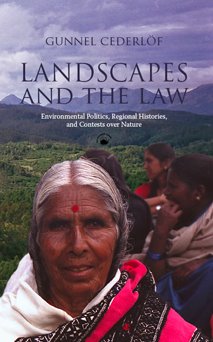 In April 2008, Associate Professor Gunnel Cederlöf, Dept. of History, Uppsala University, published a book titled ”Landscapes and the Law: Environmental Politics, Regional Histories, and Contests over Nature (Permanent Black, Delhi). It is based on recent research project on ”Environmental History of Law. State making and land conflicts in colonial
India” (more information about the research project), and in the book Dr. Cederlöf – who is the chairman of SASNET’s board – examines the role of law in consolidating early colonial rule in India from the perspective of people’s access to nature in forests and hill tracts. It is concerned thus with the social history of legal processes and the making of law. The book is focused equally on the multitude of colliding claims to land and resources, and the complex ways by which customary rights in nature are redefined and codified for the purpose of securing and legitimizing colonial sovereign rule. More information about the book.
In April 2008, Associate Professor Gunnel Cederlöf, Dept. of History, Uppsala University, published a book titled ”Landscapes and the Law: Environmental Politics, Regional Histories, and Contests over Nature (Permanent Black, Delhi). It is based on recent research project on ”Environmental History of Law. State making and land conflicts in colonial
India” (more information about the research project), and in the book Dr. Cederlöf – who is the chairman of SASNET’s board – examines the role of law in consolidating early colonial rule in India from the perspective of people’s access to nature in forests and hill tracts. It is concerned thus with the social history of legal processes and the making of law. The book is focused equally on the multitude of colliding claims to land and resources, and the complex ways by which customary rights in nature are redefined and codified for the purpose of securing and legitimizing colonial sovereign rule. More information about the book.
• New South Asia related books recommended by SASNET
SASNET also informs about some other new important South Asia related books on its web site, go for the web page. Among titles recently added to our page with recommended new books, the following appear:
– In the Presence of Sai Baba. Body, City, and Memory in a Global Religious Movement by Smriti Srinivas, Associate Professor of Anthropology, University of California, Davis.
– A Unique Crime: Understanding Rape in India. Volume edited by Swati Bhattacharjee, Kolkata, with an article by Parul Sharma from the Dept. of Law, Stockholm University.
– The Horse, the Wheel, and Language. How Bronze-Age Riders from the Eurasian Steppes Shaped the Modern World by David W. Anthony, professor of anthropology at Hartwick College, UK.
– Patterns of Middle Class Consumption in India and China by Prof. Christophe Jaffrelot, Center for International Studies and Research, Paris; and Peter van der Veer, University of Utrecht, Netherlands.
– Consumption and the Transformation of Everyday Life A View from South India by Associate Professor Harold Wilhite, Centre for Development and Environment (SUM), University of Oslo, Norway.
• More information about South Asia related
research at Swedish and Nordic universities
See SASNET’s page, http://www.sasnet.lu.se/research.html
• Indian scholarships for two Swedish students every year
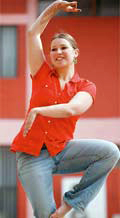
 Scholarships for studies at Indian
universities are offered on a reciprocal basis for
maximum two Swedish students every year by the Indian government
through the Indian Council
of Cultural Relations (ICCR) in New Delhi. Every year, ICCR offers nearly 2000 scholarships to international students from over 70 countries to study in different universities and educational institutions spread all over India to pursue courses from under-graduate to post-doctoral level in various subjects. Scholarships are available also for research work and non-formal courses in religion, classical music, dance and crafts. More information about the ICCR scholarships.
Scholarships for studies at Indian
universities are offered on a reciprocal basis for
maximum two Swedish students every year by the Indian government
through the Indian Council
of Cultural Relations (ICCR) in New Delhi. Every year, ICCR offers nearly 2000 scholarships to international students from over 70 countries to study in different universities and educational institutions spread all over India to pursue courses from under-graduate to post-doctoral level in various subjects. Scholarships are available also for research work and non-formal courses in religion, classical music, dance and crafts. More information about the ICCR scholarships.
The scholarships open for Swedish students cover tuition fees, and board and lodging costs. They are primarily given to university students below 35 years of age that wish to pursue 1–2 years of training in dance or music at an Indian academic institution. Applications
for scholarships are managed through the Swedish Institute in Stockholm, who pass them on to the Embassy
of India in Stockholm, before a final decision is taken by the ICCR. Last date for applications for the coming academic year is 15 January every year.
During the academic year 2007-08, the Swedish student given a scholarship is Edith Humble from Stockholm, who studies Chau and Odissi dance at Shriram Bharatiya Kala Kendra in New Delhi. She was interviewed by Shruti Vashist in India Today digital magazine (March 6, 2008), in an article titled ”Culture curry”, featuring a photo of Ms. Humble (to the right).
• Norwegian students study development and environment at CSE in India
 The Centre for Development
and the Environment (SUM – Senter for utvikling og miljø) is a
research institution formally under the University of Oslo. Since 2004, every year SUM organises a 20 credits course titled ”Development and the Environment: From Theory to Practice”. Attention is given to the relationship between North and South and to the political and commercial sides of development. A unique aspect of the course is that students will get a view from the South through lectures, discussions and excursions organised by the Centre for Science and Environment (CSE) during a one month stay in New Delhi, India. There, students are formed into groups and do research that lead to a common group report under the guidance of advisors from CSE.
Master's students from the Spring 2008 course have recently returned from their one month module in India, and these 30 students have created a magazine and a web site to communicate what they had learned about development and environment in India. More information about courses offered by CSE’s Anil Agarwal Green College.
The Centre for Development
and the Environment (SUM – Senter for utvikling og miljø) is a
research institution formally under the University of Oslo. Since 2004, every year SUM organises a 20 credits course titled ”Development and the Environment: From Theory to Practice”. Attention is given to the relationship between North and South and to the political and commercial sides of development. A unique aspect of the course is that students will get a view from the South through lectures, discussions and excursions organised by the Centre for Science and Environment (CSE) during a one month stay in New Delhi, India. There, students are formed into groups and do research that lead to a common group report under the guidance of advisors from CSE.
Master's students from the Spring 2008 course have recently returned from their one month module in India, and these 30 students have created a magazine and a web site to communicate what they had learned about development and environment in India. More information about courses offered by CSE’s Anil Agarwal Green College.
• Sweden has become an attractive option for Pakistani students
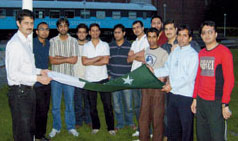 Despite the high cost of living and the language barrier, Sweden has become an attractive option for Pakistani students. Saad Rahman, representative of the Pakistani Students Association Linköping, has written an article titled ”A New Destination” for the Pakistani magazine Newsline in its May 2008 issue. The article highlights the fact that in the aftermath of 9/11, Pakistani students have made European countries a new favourite destintion. Initially, among the Scandinavian countries, Denmark, which then offered free education to foreign students, was the first choice of many students. But after Denmark started charging foreign students in 2006, many turned towards Sweden, which also offers free education to both, local and foreign students. Since then, Sweden has become one of the more popular destinations among Pakistani students. According to the statistics, about 1,177 Pakistani students were granted visas to Sweden for the academic year 2006-07. Read Saad Rahman’s article.
Despite the high cost of living and the language barrier, Sweden has become an attractive option for Pakistani students. Saad Rahman, representative of the Pakistani Students Association Linköping, has written an article titled ”A New Destination” for the Pakistani magazine Newsline in its May 2008 issue. The article highlights the fact that in the aftermath of 9/11, Pakistani students have made European countries a new favourite destintion. Initially, among the Scandinavian countries, Denmark, which then offered free education to foreign students, was the first choice of many students. But after Denmark started charging foreign students in 2006, many turned towards Sweden, which also offers free education to both, local and foreign students. Since then, Sweden has become one of the more popular destinations among Pakistani students. According to the statistics, about 1,177 Pakistani students were granted visas to Sweden for the academic year 2006-07. Read Saad Rahman’s article.
• More information about South Asia related
education at Swedish and Nordic universities
See SASNET’s page, http://www.sasnet.lu.se/education.html
• Uppsala conference on Swedish development research
![]() For the fourth time, Sida/SAREC – the unit for research cooperation within the the Swedish International Development Cooperation Agency Sida – will finance a conference on current Swedish development research, to be held in Uppsala 27–29 May 2008. Previously Sida has initiated three similar conferences, the first one in Göteborg in 2000, the second in Lund in 2003 (more information), and the third and most recent one, focusing on ”Structures of Vulnerability:
Mobilisation and Resistance”, was held in Stockholm in 2005 (more information). The 2008 conference is organised by the Centre for Sustainable Development in Uppsala, an inter-disciplinary centre for education and research on sustainable development, jointly run by Uppsala University and the Swedish University of Agricultural Sciences (SLU) in Uppsala.
The general theme for the conference will be “Meeting Global Challenges in Research Cooperation”. Researchers and development professionals are invited to gather and discuss key themes at the frontiers of research and global development issues. More specifically, the topics for discussion will be sustainable energy systems, maternal and child health, water and sanitation, soil degradation, sustainable agriculture, survival strategies of the poor, conflicts over natural resources, housing and infrastructure, human rights, democracy, global trade and climate change. Invited panels will also discuss research training strategies, future priorities in research questions and cooperation in research financing for global development.
All Sida/Sarec financed scientists and Sida staff have been invited to the Uppsala conference, as well as all others with an interest in the research areas presented. All accepted conference presentations and summaries of discussions will later be published in a book. Venue for the conference: Atrium Konferens, Dragarbrunnsgatan 46, Uppsala. More information.
For the fourth time, Sida/SAREC – the unit for research cooperation within the the Swedish International Development Cooperation Agency Sida – will finance a conference on current Swedish development research, to be held in Uppsala 27–29 May 2008. Previously Sida has initiated three similar conferences, the first one in Göteborg in 2000, the second in Lund in 2003 (more information), and the third and most recent one, focusing on ”Structures of Vulnerability:
Mobilisation and Resistance”, was held in Stockholm in 2005 (more information). The 2008 conference is organised by the Centre for Sustainable Development in Uppsala, an inter-disciplinary centre for education and research on sustainable development, jointly run by Uppsala University and the Swedish University of Agricultural Sciences (SLU) in Uppsala.
The general theme for the conference will be “Meeting Global Challenges in Research Cooperation”. Researchers and development professionals are invited to gather and discuss key themes at the frontiers of research and global development issues. More specifically, the topics for discussion will be sustainable energy systems, maternal and child health, water and sanitation, soil degradation, sustainable agriculture, survival strategies of the poor, conflicts over natural resources, housing and infrastructure, human rights, democracy, global trade and climate change. Invited panels will also discuss research training strategies, future priorities in research questions and cooperation in research financing for global development.
All Sida/Sarec financed scientists and Sida staff have been invited to the Uppsala conference, as well as all others with an interest in the research areas presented. All accepted conference presentations and summaries of discussions will later be published in a book. Venue for the conference: Atrium Konferens, Dragarbrunnsgatan 46, Uppsala. More information.
• Stockholm symposium on South Asian Languages in an Areal-Typological Perspective
A symposium on ”South Asian Languages in an Areal-Typological Perspective” will be held at Stockholm University on
Friday 30 May 2008, 10.00–16.00. It is organised by Henrik Liljegren, researcher at the Dept. of Linguistics, Stockholm University. Along with Naseem Haider from the Frontier
Language Institute in Peshawar, Pakistan, he will give a presentation on ”Some approaches to building lexical databases in
languages of the Hindu Kush”. Other participants at the symposium include Prof. Peter E. Hook from the University of Virginia, USA, who will talk about ”EAT-expressions in Hindi,
Marathi, and Kashmiri”; Dr. Joan Baart from the Summer Institute of Linguistics, who will talk about ”Stress and Tone in
North-West Indo-Aryan”; Dr. Ruth Schmidt, University of Oslo, who will talk about ”Cross-dialect variation in the
Shina vocabulary as an effect of language contact”; and Dr. Anju Saxena, Dept. of Linguistics, Uppsala University, who will talk about ”Linguistic and cultural (co)variation in Kinnauri – The case of Harijan boli and Kinnauri”. Venue:
Stockholm University, Room C307, House D, Southern House, Universitetsvägen 10 (Frescati). More information.
• Lund University Workshop on Sikhs in Europe
An Exploratory Workshop on ”The Sikhs in Europe.
History, Religion and Representation” will be held at Lund University, 13–14 June 2008. The conference is organised by the Division of Indic Religions at the Dept. of History and Anthropology
of Religion, Lund University, and funded by the Bank of Sweden Tercentenary Foundation, the Swedish Research
Council, the Swedish Council for Working Life and Social Research and the Wenner-Gren
Foundation. The invited speakers include
Prof. Shinder Thandi from Coventry University, UK, who will speak about ”Migration and History of the Sikhs in Europe”; and Prof. David Omissi, University of Hull, UK, who will speak about ”Indian Soldiers in Europe, 1914–1918”.
The entire workshop is public, and all are welcome. On the second day, discussions will also be held regarding possibilities for future European collaborative research projects on Sikhs in Europe. Students and researchers interested in this topic should register to the conference convenor, Dr. Kristina Myrvold, in beforehand. Venue: Room 118 at the Centre for Theology and Religious Studies, Allhelgona Kyrkogata 8, Lund. More information.
• Sanjay Subrahmanyam keynote speaker at the 20th ECMSAS Conference in Manchester
 The
20th European Conference on Modern South Asian Studies (ECMSAS)
will be held in Manchester, UK, 8–11 July 2008.
The 2008 conference
will be hosted by the School of Arts, Histories and Cultures at
the University of Manchester, and draws on the vibrant South Asian
Studies programmes in Humanities and Social Sciences at the University. Deadline for registration to the conference is 10 June 2008. 40 panels have been accepted, covering a vast field of scientific areas, from ”Censorship, Subjectivity, and Subversion: Cultural Regulation in India from the
Colonial Era to the Present” to ”Vegetarianisms: the communicative power of meat in South Asia” and ”Routes and Roots of Democracy in the Himalayas”. Full information about the conference panels.
The
20th European Conference on Modern South Asian Studies (ECMSAS)
will be held in Manchester, UK, 8–11 July 2008.
The 2008 conference
will be hosted by the School of Arts, Histories and Cultures at
the University of Manchester, and draws on the vibrant South Asian
Studies programmes in Humanities and Social Sciences at the University. Deadline for registration to the conference is 10 June 2008. 40 panels have been accepted, covering a vast field of scientific areas, from ”Censorship, Subjectivity, and Subversion: Cultural Regulation in India from the
Colonial Era to the Present” to ”Vegetarianisms: the communicative power of meat in South Asia” and ”Routes and Roots of Democracy in the Himalayas”. Full information about the conference panels.
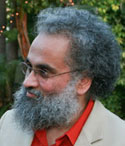 Professor Sanjay Subrahmanyam (photo to the right), Professor of Indian History at the University of
California at Los Angeles (UCLA), will hold the keynote lecture on ”Cultures of Travel between Anjou and Agra in the Early Modern World”. The conference also offers a range of cultural events including an illustrated lecture on the textiles trade between Manchester and South Asia held at the Whitworth Art Gallery, a reception at Manchester's spectacular town hall, built during the 1880s, and a club night featuring British Asian sounds, referencing Manchester's more recent status as a centre for musical innovation. An exhibition entitled 'From Kashmir to Kandy', showcasing some of the book and manuscript holdings of the John Rylands University Library on the theme of South Asia, will also be open over the time of the conference. Venue: Humanities Lime Grove building, University of Manchester Oxford Road Campus. More information at the conference
web site.
Professor Sanjay Subrahmanyam (photo to the right), Professor of Indian History at the University of
California at Los Angeles (UCLA), will hold the keynote lecture on ”Cultures of Travel between Anjou and Agra in the Early Modern World”. The conference also offers a range of cultural events including an illustrated lecture on the textiles trade between Manchester and South Asia held at the Whitworth Art Gallery, a reception at Manchester's spectacular town hall, built during the 1880s, and a club night featuring British Asian sounds, referencing Manchester's more recent status as a centre for musical innovation. An exhibition entitled 'From Kashmir to Kandy', showcasing some of the book and manuscript holdings of the John Rylands University Library on the theme of South Asia, will also be open over the time of the conference. Venue: Humanities Lime Grove building, University of Manchester Oxford Road Campus. More information at the conference
web site.
 The ECMSAS is the largest gathering of South Asia oriented researchers
in Europe, covering all fields from the humanities and social sciences
to technology, natural sciences and medicine. The conference is
held biannually under the aegis of the European Association of
South Asian Studies (EASAS), a professional, non-profit organisation
of scholars engaged in research and teaching concerning South Asia
with regard to all periods and fields of study.
SASNET organised
the 18th ECMSAS conference in Lund in 2004 (more
information about the Lund conference), and in June 2006, the
19th ECMSAS conference was arranged in Leiden, the Netherlands
(read SASNET’s report
from the Leiden conference).
The ECMSAS is the largest gathering of South Asia oriented researchers
in Europe, covering all fields from the humanities and social sciences
to technology, natural sciences and medicine. The conference is
held biannually under the aegis of the European Association of
South Asian Studies (EASAS), a professional, non-profit organisation
of scholars engaged in research and teaching concerning South Asia
with regard to all periods and fields of study.
SASNET organised
the 18th ECMSAS conference in Lund in 2004 (more
information about the Lund conference), and in June 2006, the
19th ECMSAS conference was arranged in Leiden, the Netherlands
(read SASNET’s report
from the Leiden conference).
• Silver jubilee celebration of Sanskrit Tradition in the Modern World seminar
The 25th annual meeting of the Sanskrit Tradition in the Modern World, STIMW, seminar will be organised in Machester, UK, on Friday 11 July 2008. Two years ago, STIMW moved to Manchester (previously the STIMW seminars were held at Minsteracres Retreat Centre, a monastery in the Tyne valley near to Newcastle), to continue to offer a forum for the discussion of papers on varied aspects of Indian religions. This year, STIMW celebrates 25 years by combining with the 20th European Conference on Modern South Asian Studies being held in the University of Manchester (see above). Paper proposals are particularly welcome from international scholars who would not normally be able to attend the one day event in the UK, but who will be attending the ECMSAS conference. More information.
• Anthropological
and Ethnological Sciences (IUAES) conference in China postponed
The 16th International Union of Anthropological
and Ethnological Sciences (IUAES) was supposed to be held 15–23 July
2008 in Kunming, Yunnan, China. The conference had the
overall theme ”Humanity,
Development and Cultural Diversity” and included a large
number of panels organised by researchers from India and Bangladesh. The conference has however been postponed. Full information
about the IUAES conference.
• Second announcement for 2008 World Water Week
 The
2008 World Water Week will take place in in Stockholm 17–23
August. In response to the United Nations declaration of 2008 as
the International Year of Sanitation (IYS), the upcoming
World Water Week will place special focus
on sanitation, health and hygiene issues – the theme being "Progress
and Prospects on Water: For a Clean and Healthy
World."
The World Water Week, organised by the Stockholm International Water Institute (SIWI) is
the leading annual global meeting place for capacity-building,
partnership-building and follow-up on the implementation of international
processes and programmes in water and development, with large relevance
to South Asia. It is filled with plenary sessions, seminars, workshops,
side events and special activities. The Scientific Programme Committee (SPC) planning for the conference is chaired by Prof. Jan Lundqvist, Dept. of Water and Environmental Studies, Linköping University. The World
Water Week 2008 will take place in a new venue, the Stockholm
International Fairs and Congress Center (Stockholmsmässan) in Älvsjö, 9 km south of central Stockholm. The Second Announcement is now available to download. Full
information about the World Water Week 2008.
The
2008 World Water Week will take place in in Stockholm 17–23
August. In response to the United Nations declaration of 2008 as
the International Year of Sanitation (IYS), the upcoming
World Water Week will place special focus
on sanitation, health and hygiene issues – the theme being "Progress
and Prospects on Water: For a Clean and Healthy
World."
The World Water Week, organised by the Stockholm International Water Institute (SIWI) is
the leading annual global meeting place for capacity-building,
partnership-building and follow-up on the implementation of international
processes and programmes in water and development, with large relevance
to South Asia. It is filled with plenary sessions, seminars, workshops,
side events and special activities. The Scientific Programme Committee (SPC) planning for the conference is chaired by Prof. Jan Lundqvist, Dept. of Water and Environmental Studies, Linköping University. The World
Water Week 2008 will take place in a new venue, the Stockholm
International Fairs and Congress Center (Stockholmsmässan) in Älvsjö, 9 km south of central Stockholm. The Second Announcement is now available to download. Full
information about the World Water Week 2008.
• SUM organises doctoral course on Human Rights and Legal Empowerment of the Poor
 A doctoral course titled ”Human Rights and Legal Empowerment of the Poor: Theory and Practice” will be held at the University of Oslo, 2–4 October 2008. The principal objectives for the course, organised by the Centre for Development and the Environment (SUM) at University of Oslo, Norway, is to review and evaluate human rights and legal empowerment-based approaches to the study of poverty reduction, which will enable doctoral students to understand key poverty-related concepts and approaches that are currently widespread and influential among major international and national development agencies; and to provide an arena for critical and constructive feedback to written material submitted by doctoral students. The lecturers include Dr. Dan Banik, SUM;
Prof. Arjun Sengupta, Centre for Development and Human Rights, New Delhi, India; and
Prof. Siddiq Osmani, Dept. of Economics, University of Ulster, UK.
The interdisciplinary nature of the course will appeal to students with a background in political science, economics, anthropology, geography, sociology, philosophy, development studies and law. The main target group is doctoral students at Norwegian and Nordic universities. In addition, the course will appeal to doctoral students in other European countries. The organisers are also particularly interested in the participation of doctoral students from developing countries. Application deadline is 1 July 2008. Venue: Randsvangen Hotel, outside Oslo. More information.
A doctoral course titled ”Human Rights and Legal Empowerment of the Poor: Theory and Practice” will be held at the University of Oslo, 2–4 October 2008. The principal objectives for the course, organised by the Centre for Development and the Environment (SUM) at University of Oslo, Norway, is to review and evaluate human rights and legal empowerment-based approaches to the study of poverty reduction, which will enable doctoral students to understand key poverty-related concepts and approaches that are currently widespread and influential among major international and national development agencies; and to provide an arena for critical and constructive feedback to written material submitted by doctoral students. The lecturers include Dr. Dan Banik, SUM;
Prof. Arjun Sengupta, Centre for Development and Human Rights, New Delhi, India; and
Prof. Siddiq Osmani, Dept. of Economics, University of Ulster, UK.
The interdisciplinary nature of the course will appeal to students with a background in political science, economics, anthropology, geography, sociology, philosophy, development studies and law. The main target group is doctoral students at Norwegian and Nordic universities. In addition, the course will appeal to doctoral students in other European countries. The organisers are also particularly interested in the participation of doctoral students from developing countries. Application deadline is 1 July 2008. Venue: Randsvangen Hotel, outside Oslo. More information.
• Nepal conference on Social Development and Transition
An International Conference on ”Social Development and Transition: Partners for Global-Local Partnerships” will be held in Nepal 26–28 November 2008. The conference is organised by the Asia Pacific
Branch of the International Consortium for Social Development (ICSD), and is hosted by the Dept. of Social Work at Kadambari Memorial College of Science and Management in Kathmandu, affiliated to Purbanchal University in Biratnagar. Besides the main theme on Social Development and Transition, several sub themes include poverty reduction, post conflict reconstruction, climate change, disasters, human trafficking, HIV/AIDS, etc. Venue for the conference: Dhulikhel Lodge Resort.
• Waters in South and Southeast Asia in focus for 3rd SSEASR conference
![]() The 3rd SSEASR (South and Southeast Asian Association for the Study of Culture and Religion) Conference, focusing on ”Waters in South and Southeast Asia: Interaction of Culture and Religion” will be held in Denpasar, Indonesia, 3–6 June 2009. The conference is co-sponsored as a regional conference by the parent body, International Association for the History of Religions (IAHR), and is hosted by the Institut Seni Indonesia (ISI),
and Universitas Hindu Indonesia, both institutions based in Denpasar. Session and paper proposals dealing with the study of the important role of waters in creating links between various cultures and sub-cultures of South and Southeast Asia through river channels, straits, and seas, are invited. Suggested sub-themes include
”Rivers: Routes, Rites, Rituals and Sacredness”; ”Islam: Trade and Traditions”; ”
Hinduism and Buddhism across the Seas”; and ”Christianity: Spread and Localisation”. More information.
The 3rd SSEASR (South and Southeast Asian Association for the Study of Culture and Religion) Conference, focusing on ”Waters in South and Southeast Asia: Interaction of Culture and Religion” will be held in Denpasar, Indonesia, 3–6 June 2009. The conference is co-sponsored as a regional conference by the parent body, International Association for the History of Religions (IAHR), and is hosted by the Institut Seni Indonesia (ISI),
and Universitas Hindu Indonesia, both institutions based in Denpasar. Session and paper proposals dealing with the study of the important role of waters in creating links between various cultures and sub-cultures of South and Southeast Asia through river channels, straits, and seas, are invited. Suggested sub-themes include
”Rivers: Routes, Rites, Rituals and Sacredness”; ”Islam: Trade and Traditions”; ”
Hinduism and Buddhism across the Seas”; and ”Christianity: Spread and Localisation”. More information.
• Other conferences connected to South Asian
studies arranged all over the World
See SASNET’s page, http://www.sasnet.lu.se/conferences.html#conf
Important lectures and seminars in Scandinavia
• Oslo lecture by Arjun Appadurai
Professor Arjun Appadurai from The New School in New York City, holds a lecture about ”The Ethics of Possibility in the Age of Electronic Humanity” at the University of Oslo on Thursday 22 May 2008, 13.00–16.00. Prof. Appadurai is a socio-cultural anthropologist with specializations in globalization, public culture, and urban studies. His major accomplishment has been the construction of anthropological frameworks for the study of global media, consumption, and migration. The lecture is organised by CULCOM, the Cultural complexity in the new Norway strategic university programme (more information).
All are welcome. Venue: Auditorium 7, Eilert Sundts hus, University of Oslo, Blindern.
• Anirudk Krishna lectures on poverty, democracy, and
social mobility
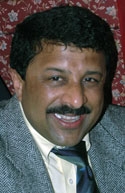 The distinguished American scholar Anirudh Krishna, Olof Palme visiting professor at the Dept. of Political Science at Uppsala University during the period 2007-2008, will lecture in Oslo on Monday 26 May 2008, 13.15–15.00. Prof. Krishna will talk about ”Poverty, Democracy and Mobility: Inquiring from 20,000 Households in
India”. The talk deals with micro-level perspectives on poverty, democracy, and
social mobility. Dr. Krishna will discuss differences between the view
from below and the outside view. A major focus is how poverty is
simultaneously both created and overcome. The seminar is jointly organised by the Institute
for Cultural Studies and Oriental Languages (IKOS), the Institute
for Archaeology, Conservation and Historical Studies (IAKH), and the Poverty and Development in the 21st Century (PAD) research programme at the Centre for Development and the Environment (SUM, all units of the University of Oslo. Venue: Lecture room 3, Georg Sverdrups hus, Blindern, Oslo. More information about Prof. Krishna.
The distinguished American scholar Anirudh Krishna, Olof Palme visiting professor at the Dept. of Political Science at Uppsala University during the period 2007-2008, will lecture in Oslo on Monday 26 May 2008, 13.15–15.00. Prof. Krishna will talk about ”Poverty, Democracy and Mobility: Inquiring from 20,000 Households in
India”. The talk deals with micro-level perspectives on poverty, democracy, and
social mobility. Dr. Krishna will discuss differences between the view
from below and the outside view. A major focus is how poverty is
simultaneously both created and overcome. The seminar is jointly organised by the Institute
for Cultural Studies and Oriental Languages (IKOS), the Institute
for Archaeology, Conservation and Historical Studies (IAKH), and the Poverty and Development in the 21st Century (PAD) research programme at the Centre for Development and the Environment (SUM, all units of the University of Oslo. Venue: Lecture room 3, Georg Sverdrups hus, Blindern, Oslo. More information about Prof. Krishna.
• Göteborg seminar with eminent international researchers on Sri Lanka
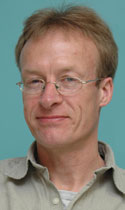 The School of Global Studies, Göteborg University, organises a seminar with two eminent international researchers on Sri Lanka, on Thursday 29 May 2008, 13.15–16.00. Professor Jonathan Goodhand (photo to the right) from the School of African and Asian Studies (SOAS), University of London, UK, and Professor Tudor Silva from Peradeniya University, Sri Lanka, will present results from their ongoing research projects. Prof. Goodhand will talk about ”The limits of liberal peacebuilding: international engagement in the Sri Lankan peace process”; and Prof. Silva will talk about ”Ethnicity, Development, Poverty, and Conflict in Sri Lanka”. Venue: School of Global Studies, room C 417, Konstepidemins väg, Göteborg.
The School of Global Studies, Göteborg University, organises a seminar with two eminent international researchers on Sri Lanka, on Thursday 29 May 2008, 13.15–16.00. Professor Jonathan Goodhand (photo to the right) from the School of African and Asian Studies (SOAS), University of London, UK, and Professor Tudor Silva from Peradeniya University, Sri Lanka, will present results from their ongoing research projects. Prof. Goodhand will talk about ”The limits of liberal peacebuilding: international engagement in the Sri Lankan peace process”; and Prof. Silva will talk about ”Ethnicity, Development, Poverty, and Conflict in Sri Lanka”. Venue: School of Global Studies, room C 417, Konstepidemins väg, Göteborg.
• ITPS seminar on Indian MNCs in Stockholm
 The Swedish Institute for Growth Policy Studies (ITPS) invites to a seminar on India’s role in World economy and how the Indian multinational corporations (MNCs) are changing the global arena, on Wednesday 11 June 2008, 13.00–17.00. The seminar is titled ”Indiska multinationella företag förändrar den globala spelplanen”. An introduction titled ”India’s emerging MNCs – threats or possibilities?” will be given by
Dr. Henrik Glimstedt, Associate Professor at Stockholm School of Economics. Dr Stefan Jonsson from ITPS’ New Delhi office, and Professor Ravi Ramamurthy, Director of the Center for Emerging Markets, Northeastern University, Boston, Director of the Center for Emerging Markets, Northeastern University, will talk about ”The evolution of India’s MNCs – policy, trends and challenges continuation”; and Professor Martin Kenney from the University of California at Davis, will talk talk about ”Where will the next MNCs come from? A view from the Indian venture capital market”. The lectures will be followed by a discussion moderated by Pernilla Ström. Venue: Wallenbergssalen, Royal Swedish Academy of Engineering Sciences (IVA), Grev Turegatan 14, Stockholm. Register your participation before Monday 9 June 2008.
The Swedish Institute for Growth Policy Studies (ITPS) invites to a seminar on India’s role in World economy and how the Indian multinational corporations (MNCs) are changing the global arena, on Wednesday 11 June 2008, 13.00–17.00. The seminar is titled ”Indiska multinationella företag förändrar den globala spelplanen”. An introduction titled ”India’s emerging MNCs – threats or possibilities?” will be given by
Dr. Henrik Glimstedt, Associate Professor at Stockholm School of Economics. Dr Stefan Jonsson from ITPS’ New Delhi office, and Professor Ravi Ramamurthy, Director of the Center for Emerging Markets, Northeastern University, Boston, Director of the Center for Emerging Markets, Northeastern University, will talk about ”The evolution of India’s MNCs – policy, trends and challenges continuation”; and Professor Martin Kenney from the University of California at Davis, will talk talk about ”Where will the next MNCs come from? A view from the Indian venture capital market”. The lectures will be followed by a discussion moderated by Pernilla Ström. Venue: Wallenbergssalen, Royal Swedish Academy of Engineering Sciences (IVA), Grev Turegatan 14, Stockholm. Register your participation before Monday 9 June 2008.
Business and Politics
• Svante Kilander appointed Swedish Ambassador to Kabul
On 8 May 2008, the Swedish Government decided to appoint Svante Kilander as Ambassador to Kabul. Sweden is thereby strengthening its diplomatic presence in Afghanistan. "The decision to establish an embassy in Afghanistan is being taken in light of Sweden's extensive engagement in the country and demonstrates the importance that the Government attaches to developments in Afghanistan," says Minister for Foreign Affairs Carl Bildt. Since 2003 Sweden has been represented in Afghanistan by a section for development cooperation and through the Swedish Embassy in Islamabad, Pakistan. The Government decided to establish an embassy in Kabul on 19 December 2007. Sweden has had diplomatic relations with Afghanistan since the 1940s. Relations today between Afghanistan and Sweden are very good. Sweden has been part of the International Security Assistance Force in Afghanistan (ISAF) since 2002 and contributes 365 soldiers to this mission. In 2007 total Swedish development cooperation in Afghanistan amounted to just over SEK 380 million.
• India seminar with Kamal Nath in Stockholm
Mr. Kamal Nath, Minister for Commerce and Industry, Government of India, again visits Sweden in the first week of June 2008. On Monday 2 June, 16.00–18.30 a seminar will be jointly organised by the Swedish Trade Council, Federation of Indian Chambers of Commerce adn Industry (FICCI), Embassy of India in Stockholm, and the Sweden-India Business Council (SIBC). Participants to the seminar will get a chance to meet Mr. Nath, and his Swedish counterpart, Minister of Trade Ewa Björling. Representatives from the Indian and Swedish business world, and from India’s Department of Industrial Policy and Promotion, will give their perspectives on the current development in Indo-Swedish business relations. Venue: Grand Hotel, Stockholm. Register your participation before Tuesday 27 May 2008. More information.
• Information about South Asia related business and politics in Sweden
See SASNET's page, http://www.sasnet.lu.se/polbuss.html
South Asia related culture in Scandinavia
• Bangladeshi baul singers perform again in Sweden
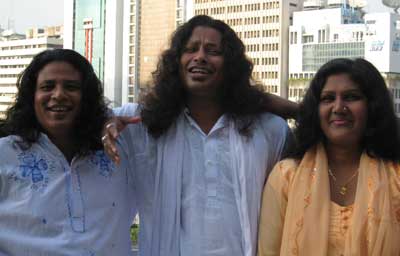 Baul Shilpi, a group of baul singers from Bangladesh who made a great success during their Sweden tour in 2003, again visits Sweden in the end of August 2008. The group, calling themselves ”God’s scapegraces” (Guds vildhjärnor), consists of seven persons – four baul singers, two other musicians, plus the tour leader Sirajul Islam. They have been invited to Sweden by Dr. Christina Nygren, Dept. of Musicology and Theatre Studies,
Stockholm University. On Tuesday 26 August at 19.00, a Baul Shilpi performance will be held at the theatre Sagohuset in Lund. Earlier the same day, SASNET organises a seminar on baul music and other forms of Bengali folk culture with Dr. Nygren (who wrote a wonderful book, ”Brokiga Bengalen” on this topic in 2006). More details about the seminar and the performance will follow. More information about Baul Shilpi (in Swedish only).
Baul Shilpi, a group of baul singers from Bangladesh who made a great success during their Sweden tour in 2003, again visits Sweden in the end of August 2008. The group, calling themselves ”God’s scapegraces” (Guds vildhjärnor), consists of seven persons – four baul singers, two other musicians, plus the tour leader Sirajul Islam. They have been invited to Sweden by Dr. Christina Nygren, Dept. of Musicology and Theatre Studies,
Stockholm University. On Tuesday 26 August at 19.00, a Baul Shilpi performance will be held at the theatre Sagohuset in Lund. Earlier the same day, SASNET organises a seminar on baul music and other forms of Bengali folk culture with Dr. Nygren (who wrote a wonderful book, ”Brokiga Bengalen” on this topic in 2006). More details about the seminar and the performance will follow. More information about Baul Shilpi (in Swedish only).
• More information about South Asia related culture
in Sweden and Scandinavia
See SASNET’s page, http://www.sasnet.lu.se/culture.html
New and updated items on SASNET web site
• Swedish departments where research on
South Asia is going on:
Constantly added to the list of research environments at Swedish
universities, presented by SASNET. The full list now includes 227 departments,
with detailed descriptions of the South Asia related research and education
taking place! Go to http://www.sasnet.lu.se/environment.html
• Useful travelling information
Look at http://www.sasnet.lu.se/travelling.html.
Updated travel advises from the The British Foreign & Commonwealth
Office about safety aspects on travelling to the countries of
South Asia.
Best regards,
Lars Eklund
SASNET/Swedish South Asian Studies Network
SASNET is a national network
for research, education, and information about South Asia, based at Lund
University. The aim is to encourage and promote an open and dynamic networking
process, in which Swedish researchers co-operate with researchers in South
Asia and globally.
The network is open to all sciences. Priority is given to co-operation
between disciplines and across faculties, as well as institutions in the
Nordic countries and in South Asia. The basic idea is that South Asian
studies will be most fruitfully pursued in co-operation between researchers,
working in different institutions with a solid base in their mother disciplines.
The network is financed by Sida (Swedish
International Development Cooperation Agency) and by Lund
University.
Postal address: SASNET – Swedish South Asian Studies Network,
Scheelevägen 15 D, SE-223 70 Lund, Sweden
Visiting address: Ideon Research Park, House Alpha 1 (first floor,
room no. 2040), in the premises of the Centre for East and South
East Asian Studies at Lund University (ACE).
Phone: + 46 46 222 73 40
Fax: + 46 46 222 30 41
E-mail: sasnet@sasnet.lu.se
Web site:
http://www.sasnet.lu.se
SASNET - Swedish South Asian Studies Network/Lund
University
Address: Scheelevägen 15 D, SE-223 70 Lund, Sweden
Phone: +46 46 222 73 40
Webmaster: Lars Eklund
Last updated
2011-01-19